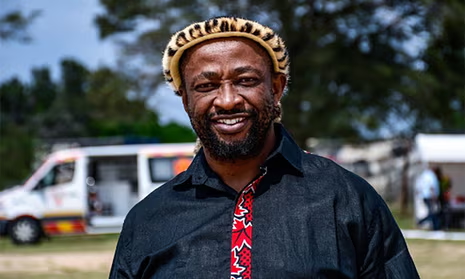Eswatini’s main opposition party, the People’s United Democratic Movement (Pudemo), has reported that its leader, Mlungisi Makhanya, 46, has been poisoned in what they describe as an assassination attempt. Makhanya, who has been living in exile in South Africa for the past two years, is currently receiving treatment in a Pretoria hospital.

“Our president has been stabilised but he is still in a critical condition,” Pudemo said in a statement. The party claims the incident occurred in the early hours of Tuesday inside Makhanya’s residence in Pretoria, allegedly involving an unnamed “young boy” whom they describe as an “agent of evil intent by Swazi government.”
Wandile Dludlu, Pudemo’s deputy president, stated in a press briefing that an “extremely dangerous and fatal” pesticide poison was used in the attack. The Swaziland News website reported that Makhanya was rushed to a hospital under South African police escort and later moved to the Intensive Care Unit (ICU).
Eswatini government spokesman Alpheous Nxumalo denied state involvement, stating, “Government does not kill or poison suspects.” He emphasized that law enforcement agencies adhere to strict ethical and professional standards.
This alleged assassination attempt comes amid ongoing political tensions in Eswatini, Africa’s last remaining absolute monarchy. Pudemo says the incident precedes planned protests next month calling for multi-party elections in the kingdom, where political parties are banned from participating in elections.

Makhanya fled to South Africa in 2022 after his home in Eswatini was reportedly firebombed in an attack allegedly carried out by state agents. His party, Pudemo, is one of the leading pro-democracy organizations in Eswatini but is prohibited from participating in elections.
The incident has drawn attention to the broader political situation in Eswatini, where King Mswati III has ruled by decree since 1986. Critics accuse the monarch of suppressing dissent and maintaining an extravagant lifestyle while much of the population lives in poverty.
As investigations continue, Pudemo has appealed for international support to ensure Makhanya’s security and that of his family. The Swaziland Solidarity Network, a group of Swazis in South Africa, has called on the South African government to take action against what they term Swazi state agents targeting exiled pro-democracy activists.
This alleged poisoning follows a series of violent crackdowns on pro-democracy protesters in Eswatini, including deadly clashes in 2021 that reportedly resulted in at least 46 deaths, according to Human Rights Watch.
As Makhanya receives treatment, the incident has reignited debates about political freedom and human rights in Eswatini, with potential implications for regional stability and democratic movements in southern Africa.



